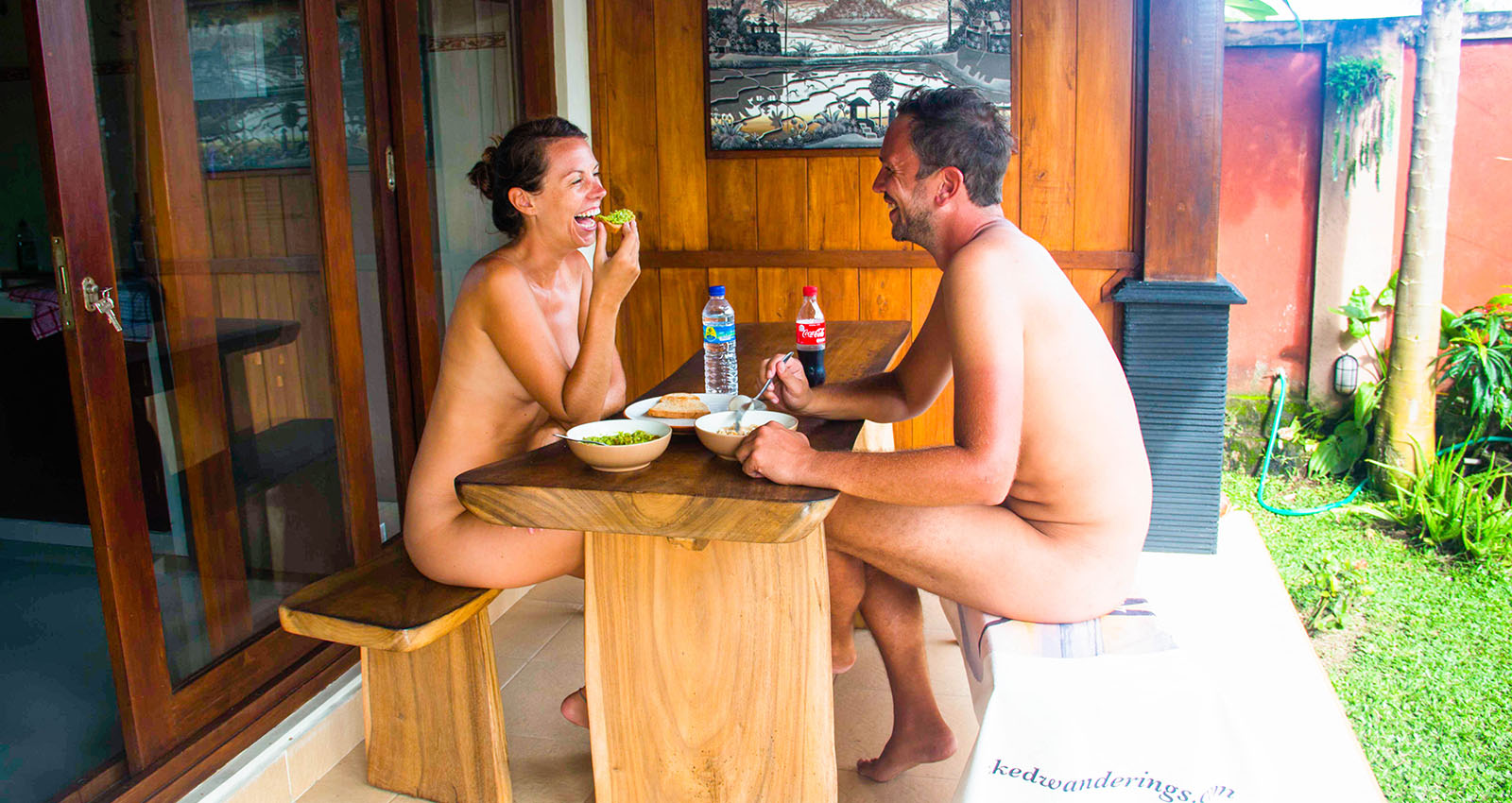If you’ve been following this blog for a while, you may have noticed that we often use a comparison with veganism as an example to explain certain aspects of naturism. There’s no need to worry, our goal is not to convince every naturist to adopt a vegan lifestyle. Or vice versa. But we noticed that although both are quite distinct, they share a number of similar values.
It appears that the concept of not using or consuming animal products seems a lot easier to comprehend than the concept of non-sexual nudity. Maybe because one is more tangible than the other? Or is it because veganism has become more known than naturism? That we can’t explain. But if you do find yourself with questions about naturism, it’s often helpful to ask “What would the vegan do?”.
View this post on Instagram
The same roots
Both the concepts of “modern” naturism and veganism originate from the first half of the 20th century and could be called a result of the industrial revolution. While naturism was mostly focusing on reintegrating nature into our lives, the vegan philosophy spotlighted the growing exploitation of animals. Respect for nature and our surroundings can be seen as a very common ground.
Note the word “modern” in the previous paragraph, because both the idea of social nudity and not consuming animal products can be traced back much further than the 20th century. In ancient Greece, for example, sports were by default practised in the nude. Around the same time in Greece, the philosophical school of Pythagoras taught the avoidance of harm to all living beings, including animals.
View this post on Instagram
Both have strong activism
As it typically goes with philosophies that turn into movements, there’s quite some activism behind it. Which isn’t always beneficial for the public image. We remember from our childhood that vegans were mostly pictured as skinny people with mohawks and anarchy signs on their jeans jackets who wrote “Meat is murder” on the walls of McDonalds. Naturists, on the other hand, were middle-aged white men who appeared full-frontal naked in human interest programs.
It’s important to realise that although activists are necessary to provoke a change in mentality, they don’t represent the whole scope of a movement. You don’t need to cherish deep hate for hamburger chains in order to be a vegan. Nor does every naturist needs to be willing to preach about the benefits of naturism while naked in front of a camera. Everyone has their place in a movement, it’s just that you often only hear the voices of those in the front row.
View this post on Instagram
There have to be rules
In previous posts, we already used the example of the person who asked us whether it’s okay to walk around in boxers at a naturist resort. Although different resorts have different rules when it comes to clothing, if you just want to walk around in boxers all day, a naturist resort is not the place for you. We always wonder where those questions come from. How difficult is it to understand the concept of nudity?
This is where we like to use the comparison with veganism. Do vegans also get the question of whether it’s fine to eat a lamb chop in their restaurant? How about some chicken wings? Maybe a sausage? We doubt it. No animal products is no animal products. Period. Similarly, nude is nude.

The difference here is that vegans don’t consume animal products no matter what, whereas naturists do wear clothes when it’s more comfortable or appropriate. Wearing clothes doesn’t make you less of a naturist, because naturism is a mindset. One could say that from this point of view, veganism is more like a practice, but that’s not entirely true. We have a vegan friend who will eat meat or fish, but only if she witnessed (and approved) the production process.
View this post on Instagram
It’s a choice
Some vegans were born in a vegan family, just like some naturists were born in a naturist family. Some adopted their lifestyle at a very young age. Some became vegan because they are allergic to animal products and we met a person with a skin disease who can only feel comfortable when naked. But overall, we can say that both naturism and veganism are a choice.
This is a positive thing because it means that you can easily try it. You don’t need to become a member of a club, you don’t need to get somebody’s approval, and you don’t even need to worry about what happens next. If you want to try veganism, you just stop consuming animal products. Soon enough, you’ll figure out if this is something for you, and if not, you can switch back just like that.
It’s the same with naturism, we often say that it’s not like getting a tattoo. It’s not permanent if you don’t want it to be. You can just go to a naturist resort or a nude beach and give it a try. You can even try it at home. Just take off your clothes and be naked. If you don’t enjoy it, you can put your clothes back on and not be a naturist anymore.
View this post on Instagram
Can we live together?
We eat vegan food from time to time, but hardly ever in a vegan restaurant. Most of the time, we’re just in whatever restaurant where the vegan options happen to be the most attractive. Veganism has gained quite some popularity recently and we think that this has at least partly to do with non-vegan restaurants putting vegan options on their menu.
Of course, there will always be vegans who prefer vegan restaurants, because they like to be among like-minded people or because they can’t stand the sight or smell of grilled meat. But for many others, the combination works best because now they can go with their non-vegan friends to a restaurant where everyone can eat what they like.
You probably see where we are going with this. It’s quite known that we are fans of the clothing-optional concept and also here, we see similarities with veganism. There will always be naturists who don’t feel comfortable when clothed people are around. But for those who don’t care, clothing-optional has the benefit that you can take your textile friends. And just like us eating vegan food at a non-vegan restaurant, we believe that if more places would allow nudity without enforcing it, there would be more people who give it a try.

Support Naked Wanderings
Do you like what we do for naturism and naturists?
Did we make you laugh or cry?
Did we help you find the information you were looking for?
Then definitely join our Patreon community!





I had a vegan friend who died of malnutrition at about age 40. I had another friend who’s obesity and cardio problems killed him at about 50. About 11% of Americans now are diabetic. Obesity is rampant on beaches everywhere. The health consequences of veganism are well documented.
We humans are obligate carnivores by evolution and biology. And for nudists, carnivore humans are apparently immune to sunburn — according to many on-line reports. No toxic sunblocker chemicals needed. Full vitamin D for our health.
Meanwhile there are very few carnivore restaurants. I’ve never seen one that didn’t try to load us up with plant products.
I follow a carnivore way of eating and wouldn’t say I’m immune to sunburn – too much time on the nude beach and I still can get burnt. However, I can tolerate much more time in the sun than my non-carnivore friends.
As for restaurants, I have a dream of someday opening a chain of restaurants serving those who follow carnivore and other meat-based ways of eating, without the toxic seed oils and industrial foodstuffs. Requires tons of capital though.
We believe that it’s all about balance, too much of one or the other is never good.
I was scared s**tless by a vegan once. One of my college bud’s kids (his son) was getting married in Texas, and we all flew down there. His daughter was a die-hard vegan.
And she had to be rushed to the hospital for some unforeseen ailment while we were there. All I know is that she didn’t want to eat any of the food – no Tex-Mex bbq, no tacos, etc. Finally her Mom scolded her = “You’re not a victim here. YOU MADE A CHOICE.”
That being said – movin’ right along –
Veganism and Naturism are not the same. Veganism is a mode of living where the consumption of meat, fish, and dairy are prohibited – and – if someone “breaks the cycle” – he/she isn’t vegan anymore. If you eat vegan six days a week but want to go for a hamburger at McDonald’s on Sunday – you’re not vegan.
Naturism / nudism? If it gets cold, or I go to a place where I have to wear clothing, it’s not a problem – I am NOT compromising naturist values by wearing clothing where it’s practical.
True, wearing clothes in certain circumstances doesn’t make you less of a naturist. Whereas vegans can’t eat meat from time to time. But it’s only a contradiction if you see nudity as the one aspect that defines naturism. If you look at the definition, the foundation is respect and social nudity is just a means of accomplishing this. If you like to call other people ugly or fat one day a week, you can’t really call yourself a naturist either.
Oh, Nick, Lins —
I like my meat and fish – as you do!
Desde los orígenes del naturismo a finales del S.XIX, principios del XX, el naturismo definía un estilo de vida de “vuelta a la naturaleza” con características como: nudismo social, medicina “natural”, vegetarianismo, deporte en la naturaleza, vida en común etc… aunque el tiempo ha pasado y la comunidad naturista es amplia y diversificada, “el respeto a uno mismo, a los otros y al medio ambiente”, … sobre todo este último, siguen siendo elementos diferenciadores de solo “nudista”. El veganismo puede ser una opción dietética que puede identificarse con una “vida mas natural”, aunque no tiene porque serlo obligatoriamente, este tándem puede ser bueno para algunos naturistas que así lo sientan. Somos por naturaleza una familia muy diversa, en el que caben muchas combinaciones. ¡ Buen viaje por las tierras de la cuna de la humanidad !
I feel like naturalism, has much more in common with an ancestral diets like paleo or carnivore, than with veganism. Regenerative farming cannot be practiced without animals. Whereas veganism relies heavily on the production of grains. Vegans are right when they point out that there are problems with industrial farming. But instead of reconnecting with natural cycles of nature, they turn their backs on the production of animals all together. This has adverse effects on soil quality and wildlife. This is not only harmful to animals. It’s harmful to the planet. I believe that as a species we evolved eating animals, and it is unhealthy and unnatural to completely remove them from our diets.
In short, I am anti-veganism because I believe that veganism is bad our health, it’s bad for animals, and it’s better for the environment.
While the aims of veganism are worthy, sadly our bodies aren’t built to be vegan in the long term. We evolved as a species to be omnivores and our stomachs and the size and configuration of our digestive systems are that of mammalian omnivores. So, although the ideology of veganism is similar to that of naturism, the big difference is that practicing naturism can make you more healthy, mentally and physically, whereas being a full time vegan will damage your health in the long term, unless you are extremely careful combing plant proteins and supplement to the hilt with vitamins and minerals that can only be found in animal products.
i would feel shy and may not feel comfortable as mister sinner needs to be held still not hanging around
The analogy seems to have a few weak points to me:
1. Even in a very meat-oriented restaurant no one is actually forced to eat meat, you can always order e.g. fries and water, while in a textile-oriented resort everybody is strictly forced to have their clothes on.
2. I can hardly imagine a meat lover who would reject a restaurant only because it has one vegan position in the menu (given that there are enough other positions to choose from), but I can very easily imagine a textile lover who rejects a resort because of meeting one naked person inside.
3. Therefore, it would be nothing strange for a city if all its restaurants offered at least one vegan dish (it is just the situation that we tend to) but it would be quite unacceptable for many if all its swimming pool offered a sight of at least one naked swimmer.
4. For a restaurant owner there will be perhaps no income increase if he or she remove all vegan positions from the menu (I suppose just the opposite), while for a resort owner it might be some income increase to introduce strictly textile policy, that is why making a resort cloth-optional may (though fortunately don’t have to) be a step towards making it fully textile; that is the process that I have observed in some places and it makes me a bit worried.
5. You write about the process of introducing vegan dishes to non-vegan restaurants menus and as an analogy about the process of introducting dressed guests to naturist resorts; in my opinion a better analogy would be a process of introcuding naked guests to textile resources (as they increase a number of vegan-friendly and nudist-friendly places respectively) which unfortunately is still quite rare situation.
Of course, this is not a solid comparison and you make a lot of valid points about the differences.
About point 4, we’ve noticed that as well, but we’ve also seen that it’s sometimes the wrong choice. Naturist venues may start realising that the textile market is a lot bigger than the naturist market, and decide to focus on the larger market. But they fail to realise that the competition is also a lot bigger. It’s often much better to be 1 of 3 naturist resorts than 1 of 15O textile ones.